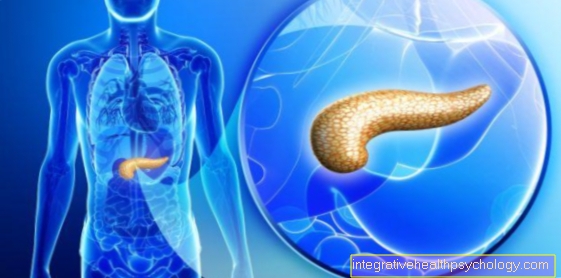Sore throat while breastfeeding
introduction
A sore throat is a symptom of an inflammation of the lining of the throat (pharyngitis).
Sore throats often go hand in hand with colds, which is inflammation of the airways and fever.
The reason is mostly viruses and less often bacteria. Sore throats of course also occur during breastfeeding. Breastfeeding women undergo changes in their hormonal balance and immune system.
It is believed that pregnant and breastfeeding women are susceptible to certain pathogens that cause inflammation of the pharynx.
Read more about our main topic under: Sore throat

Am I contagious to my baby yet?
If a mother has a cold, the flu or a mild infection, the body quickly forms antibodies that protect the breastfed baby.
As a mother, breastfeeding transfers antibodies to the baby. The antibodies help the breastfed baby to continue to protect itself against the pathogens. Many pathogens are transmitted by droplet infection. This means that a nursing mother can infect the baby if she sneezes or coughs on it.
Transmission of pathogens through breast milk is less likely.
Instead, the breast milk supports the baby's immune system.
Read more on the subject below: Breastfeeding
What can I do not to infect my baby?
As a nursing mother, you can infect your baby with a sore throat.
There are simple tricks to protect the baby from infection.
A cold is mainly transmitted by droplet infection, such as coughing or sneezing. If you have to cough or sneeze when you are close to the baby, turn your head to one side.
Hygiene is very important. Therefore, you should wash your hands very often and thoroughly.
If the baby sleeps in your bed with you, the bed linen must be changed more often.
Breastfeeding supports the baby's immune system and should definitely be continued.
Are you more interested in this topic? Then read our next article below: Breastfeeding with a cold
What medication can I take?
The drug cetylpyridinium chloride can be taken for sore throats during breastfeeding that do not subside despite home remedies and sufficient fluids.
The agent cetylpyridinium chloride (trade names including Dobendan Strepsils®, Anginette®) is an antiseptic.
It works against inflammation in the mouth and throat area.
Cetylpyridinium chloride can be taken in the form of lozenges, lozenges, solutions or throat spray.
Contraindications to the drug are a known hypersensitivity to the active substance, damage to the mucous membrane and a contact allergy.
The drug acetylsalicylic acid, known as Aspirin®, should not be used while breastfeeding. Paracetamol and ibuprofen are preferable to acetylsalicylic acid.
There are also salts that can help with a sore throat.
Pastilles (e.g. Emser Pastillen®) contain charged particles that neutralize acidic metabolic products on the mucous membrane of the mouth and throat. The production of saliva is stimulated and the symptoms of a sore throat are relieved.
The next article may also be of interest to you: Painkillers while breastfeeding
These home remedies can help
Both warm and cold compresses can relieve a sore throat.
- Cool compresses reduce inflammation, pain and difficulty swallowing.
- Warm wraps promote blood circulation, have a relaxing and pain-relieving effect.
Warm wraps with tea are a popular home remedy. To do this, moisten a cloth with chamomile, thyme or sage tea and wrap the cloth around your neck.
You can use another cloth to fix the wrap and leave the wrap on your neck until the warming effect subsides.
Cold compresses are often used when there is also difficulty swallowing in addition to the sore throat.
You can quickly make a cooling quark wrap. To do this, you put quark on a cloth and fold the cloth over so that the quark does not lie directly on the skin. The wrap is attached to the neck with another cloth.
In addition, fluids play an important role in a sore throat. Drinking a lot moistens the mucous membranes and makes it more difficult for the pathogens to penetrate and multiply.
- Herbal teas are beneficial and promote healing.
- Sage tea has an anti-inflammatory effect.
- Thyme helps cough up.
- Ginger tea, which also has an anti-inflammatory effect, is very popular for sore throats.
Gargling with salt water is a tried and true home remedy that is effective in relieving a sore throat.
To do this, add a teaspoon of table salt to a cup of warm water and gargle the solution.
You gargle a long sip every two to three hours and then spit it out. You can also use chamomile or sage tea for gargling.
Additionally, inhaling sage tea can help moisten the throat, relieve swallowing difficulties, and clear the airways.
Homemade chicken soup has been recommended for generations. The protein cysteine it contains is said to have an anti-inflammatory effect.
In addition, the chicken soup has a positive effect on the water and mineral balance.
For detailed information on this topic, see:
- Home remedies for a sore throat
- Home remedies for tonsillitis
tea
If you have a sore throat, hot drinks like teas are particularly beneficial.
Lots of fluid supports the damaged mucous membranes and relieves pain.
Herbal teas have healing properties. Sage tea has an anti-inflammatory effect and soothes the lining of the mouth and throat. Thyme tea helps with cold symptoms if the airways are affected in addition to the throat. Linden blossom tea helps with cold viruses.
Ginger tea is becoming increasingly popular for sore throats. The beneficial tea has anti-inflammatory effects and supports the immune system.
homeopathy
There are various homeopathic globules and Schüssler salts that can be used for sore throats.
For dry, burning throat and difficulty swallowing, there are the remedies Barium carbonicum, Aconitum napellus or Belladonna. There are numerous different globules, depending on the cause of the sore throat and its accompanying symptoms.
Schüsslers salts for sore throats are Ferrum phosphoricum, Kalium chloratum, Kalium sulfuricum or Calcium sulfuricum.
If you have a pronounced sore throat and accompanying symptoms such as fever, you should still consult a doctor during breastfeeding.
Would you like more information on this topic? Read more under: Homeopathy for a sore throat
Accompanying symptoms: difficulty swallowing
Difficulty swallowing often occurs as an accompanying symptom of a sore throat.
Characteristic swallowing difficulties are a feeling of lump in the throat, increased salivation and pain when eating.
If you have severe swallowing difficulties, you may even experience a gag reflex while swallowing food, gagging of food that has already been swallowed or coughing while / after eating.
Read more on the subject below:
- Home remedies for swallowing difficulties
- Causes of difficulty swallowing
fever
The temperature or the fever can be an indication of the cause of the symptoms.
In the case of a flu-like infection or a cold, in addition to a sore throat and other symptoms, an elevated temperature to a slight fever can occur.
With real flu, the fever is usually high. Fever and sore throat can also be symptoms of acute tonsillitis.
A doctor should be consulted if there is a sore throat and fever during breastfeeding.
Read more on the subject below: Can I breastfeed if I have a fever?





























